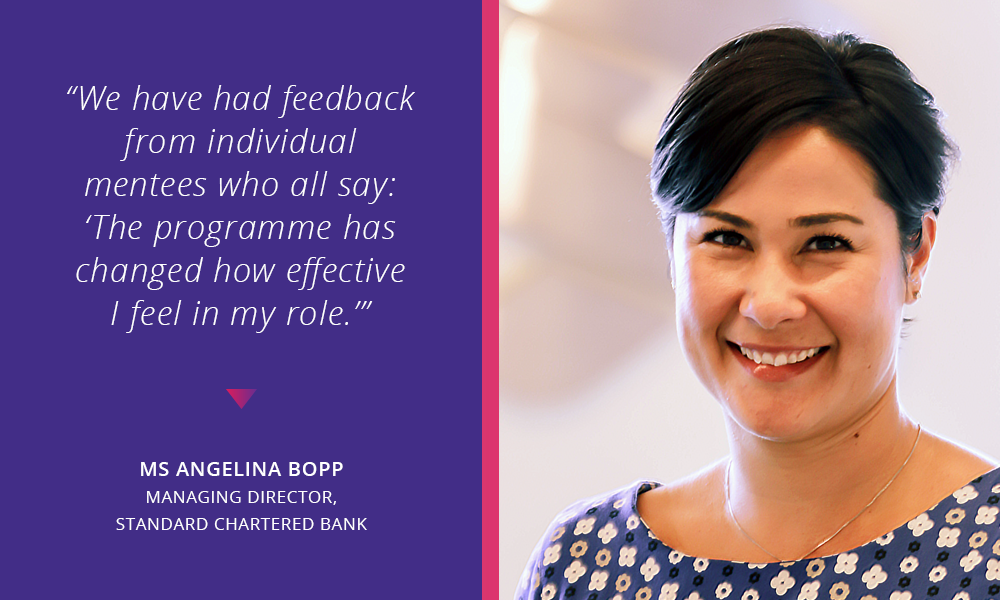It may be tempting to assume your employees are motivated by one thing: Pay. Actually, a study of fresh Singaporean graduates found that 67% quit their first job in under a year because they wanted more professional growth (only 42% said the primary reason for leaving was for more money).
There’s an easy way to provide that growth and attract candidates: Mentorship, where experienced staff share invaluable expertise with more junior team members.
But what are the benefits of mentoring for employers?

Mentoring programmes boost satisfaction and retention
…And not just of new hires. Acting as coaches helps mature staff feel valued. In fact, one study found a benefit of employing older staff is that they provide better coaching than younger staff. Use veterans to train younger members, and both are likelier to stay with you.
Retention also strengthens your bottom line. The amount spent to replace an employee could be up to 60% of their salary — so it pays to keep people on.
Like what you’re reading? Click here to receive more employer-centric content in your mailbox!
Want to show your commitment to coaching the next generation of employees? Share this article.
Mentoring fosters smarter, more efficient teams
Angelina Bopp, Managing Director of Standard Chartered Bank, knows all about embracing mentoring. Standard Chartered began with pilot mentor programmes, then, looking for scalability and structure, hired an external mentorship agency, Protégé, to assist the bank with a bespoke model.
“We’ve had feedback from mentees who say, ‘The programme has changed how effective I feel in my role; I’m more willing to speak up; I’m more willing to consider new opportunities and feel braver in considering them,’” Ms Bopp shares.
Mentoring also breeds practical abilities. As one mentee of the Protégé programme (who was part of a project unrelated to Standard Chartered) said, “It challenged me to discover new ways of developing my skills and thinking outside the box” — attributes that can boost performance in any company.
Read Also: How to Keep Your Women Employees Engaged (and Why it Matters)

Mentoring encourages upskilling for everyone
Many companies embrace “reverse mentorship”, where youthful staff teach superiors. For example, guiding them on how to forge a corporate social media presence.
Learning, in short, is a two-way street. Studies find that sharpened leadership skills are enjoyed not just by mentees — but mentors too. As Ms Bopp explains, Standard Chartered mentors say the opportunity “made me much more aware of diversity and inclusion issues, and I have changed my approach in terms of how I’m managing my team”.

Mentorship: Where to start
Source ideas: Pull in staff, not just to brainstorm how they want to see the programme run, but to share expectations.
Start small: Ms Bopp notes, “It doesn’t need to be a huge programme. You just need two people: a mentor and mentee, who are able to develop trust.” That test can then feed learnings into a company-wide programme.
Create a framework: Set up a structure that’s easy to follow. For example, develop a questionnaire that mentors can give to mentees to outline expectations.
Explore mentorship courses
Want to train staff to become strong mentors? There are plenty of options:
- The Art of Coaching, Mentoring and Managing Staff — for Finance Professionals is a course that you can pay for with SkillsFuture credits. Participants will learn to nurture their own coaching style, how to understand employee capabilities and more, through lectures, exercises and role-play.
- Practical Mentoring Skills: A one-day course by the SMF Centre for Corporate Learning which drills into the fundamentals — what is mentoring? What’s in it for you? What skills, such as questioning techniques and active listening, can you apply?
- The British Council also runs a one-day course. It covers similar topics to the SMF course, like establishing rapport and dealing with issues that halt the momentum.
















